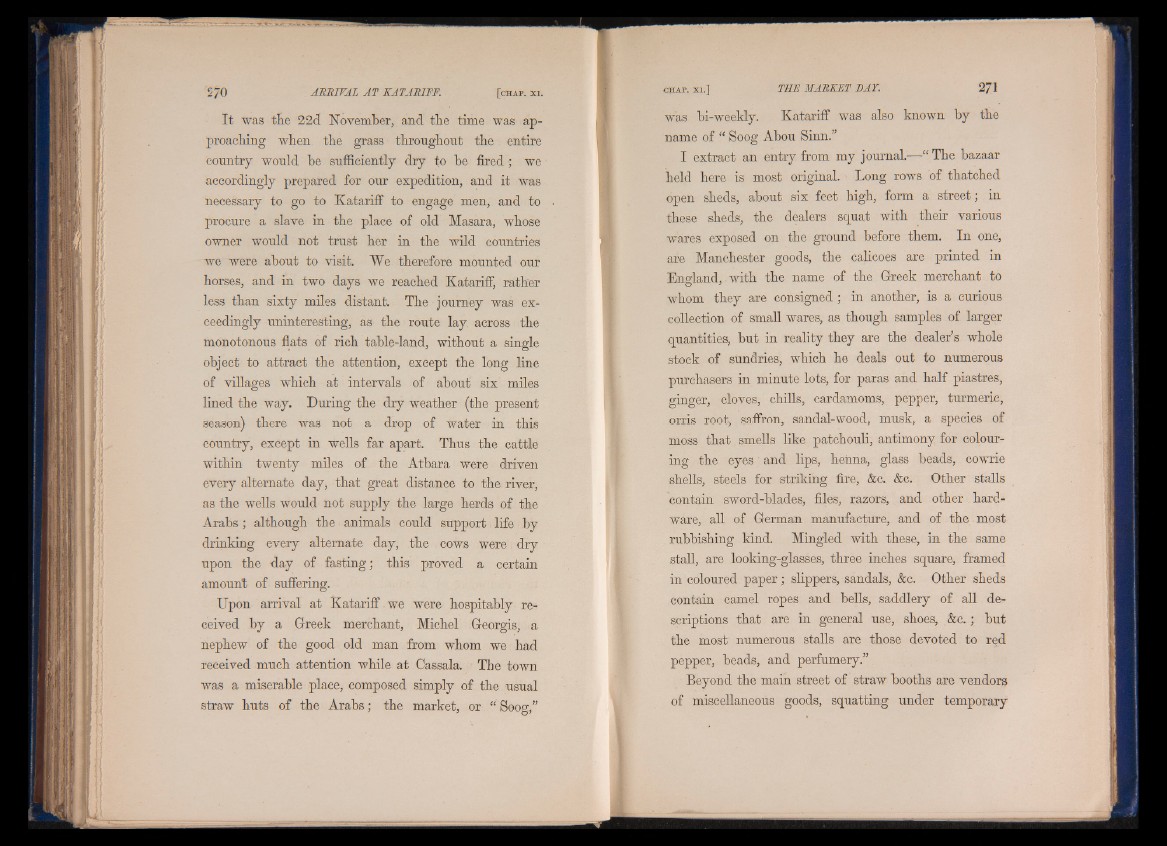
It was the 22d November, and the time was approaching
when the grass throughout the entire
country would be sufficiently dry to be fired •; we
accordingly prepared for our expedition, and it was
necessary to go to Katariff to engage men, and to
procure a slave in the place of old Masara, whose
owner would not trust her in the wild countries
we were about to visit. We therefore mounted our
horses, and in two days we reached Katariff, rather
less than sixty miles distant The journey was exceedingly
uninteresting, as the route lay across the
monotonous flats of rich table-land, without a single
object to attract the attention, except the long line
of villages which at intervals of about six miles
lined the way. During the dry weather (the present
season) there was not a drop of water in this
country, except in wells far apart. Thus the cattle
within twenty miles of the Atbara were driven
every alternate day, that great distance to the river,
as the wells would not supply the large herds of the
Arabs; although the animals could support life by
drinking every alternate day, the cows were dry
upon the -day of fasting; this proved a certain
amount of suffering.
Upon arrival at Katariff we were hospitably received
by a Greek merchant, Michel Georgis, a
nephew of the good old man from whom we had
received much attention while at Cassala. The town
was a miserable place, composed simply of the usual
straw huts of the Arabs; the market, or “ Soog,”
was bi-weekly. Katariff was also known by the
name of “ Soog Abou Sinn.”
I extract an entry from my journal/—“ The bazaar
held here is most original.' Long rows of thatched
open sheds, about six feet high, form a street; in
these sheds, the dealers squat with their various
wares exposed on the ground before them. In one,
are Manchester goods, the calicoes are printed in
England, with the name O 3 of the Greek merchant to whom they are consigned ; in another, is a curious
collection of small wares, as though samples of larger
quantities, but in reality they are the dealer’s whole
stock of sundries, which he deals out to numerous
purchasers in minute lots, for paras and half piastres,
ginger, cloves, chills, cardamoms, pepper, turmeric,
orris root, saffron, sandal-wood, musk, a species of
moss that smells like patchouli, antimony for colouring
the eyes and lips, henna, glass beads, cowrie
shells, steels for striking fire, &c. &e. Other stalls
contain sword-blades, files, razors, and other hardware,
all of German manufacture, and of the most
rubbishing kind. Mingled with these, in the same
stall, are looking-glasses, three inches square, framed
in coloured paper; slippers, sandals, &e. Other sheds
contain camel ropes and bells, saddlery of all descriptions
that are in general use, shoes, &c.; but
the most numerous stalls are those devoted to red
pepper, beads, and perfumery.”
Beyond the main street of straw booths are vendors
of miscellaneous goods, squatting under temporary